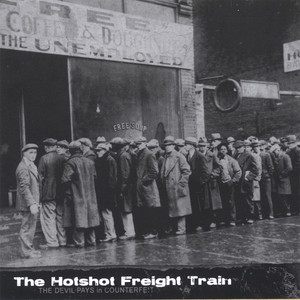
The Devil Pays In Counterfeit
- 流派:Country 乡村
- 语种:英语
- 发行时间:2007-01-01
- 类型:录音室专辑
- 歌曲
- 时长
简介
BIO Rock N’ Roll music began as arguably the greatest cultural phenomenon of the mid-twentieth century and quickly became a vehicle for musicians to express the opinions and concerns of their generation. Sadly, modern music has become more enthralled with image, sexual exploitation, and album sales rather than art and social awareness. The Hotshot Freight Train formed in January of 2005 with the desire to create a brand of Rock N Roll that uplifts and engages. The band’s moniker is derived from a common literary device used by beat poet Jack Kerouac to accentuate the sound and the excitement of fast moving, high priority trains that were often used as transportation by migrant workers and transients alike. The Hotshot Freight Train draws musical influence from numerous bands such as Wilco, The Clash, Superdrag, The Weakerthans, and Uncle Tupelo. However, the bands greatest inspiration comes from the great story tellers of Rock N’ Roll like Tom Waits, Johnny Cash, Bruce Springsteen, Neil Young, and Elvis Costello who bring their art alive by creating music that removes the veil between the artist and audience. Though The Hotshot Freight Train would never mention themselves in the same breath as the artists they so respect, their goal is to capture the same effect through their own music. The ultimate intention of the music and songwriting is to capture the mind, imagination, and spirit of the audience, or simply tell a story. The Hotshot Freight Train is: Joshua Tipton Caleb Tipton Josh Hutson Greg Barker The Devil Pays in Counterfeit is an album that speaks on numerous social issues and concerns. The overarching theme of the album focuses upon the human condition and the struggle to embrace life regardless of ones circumstances. Each song is intended to tell a story. The songs “Love Like Heroin” and “Don’t Fight It” discuss the problem of personal addiction and the consequential disintegration of families. “Zoltar” and “Liars Like Us” underscore the individuals’ struggle to find identity. “My Dear, Sweet Little Faith” tells the true story of a young girl who was sexually abused by a family member and was placed in foster care. “Had I Known” and “Too Close To Let Go” portray the difficulty in dealing with death and depression. “My Holy Spirit” reveals the hope found in personal faith. “Appalachia” captures a representation of the influence of Christian religious belief and symbolism on the Southern United States. “This Train” and “On and On” emphasize the importance of contentment and joy in an often tedious existence.




